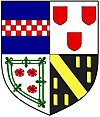Clan Boyd
| Boyd | |||
|---|---|---|---|
| Buidhe | |||

Crest: A dexter hand erect and pale having the outer fingers bowed inwards
|
|||
| Motto | Confido (I trust) | ||
| Profile | |||
| Region | Lowlands | ||
| District | Ayrshire | ||
| Plant badge | Laurel leaves | ||
| Chief | |||
 |
|||
| Alastair Boyd (deceased). | |||
| 7th Baron Kilmarnock, The Rt. Hon Lord Kilmarnock | |||
| Seat | Kilmarnock | ||
| Historic seat | Dean Castle, Ayrshire | ||
|
|||
|
|||
|
|||
|
|||
Clan Boyd is a Scottish clan and is recognized as such by the Lord Lyon King of Arms.
The name Boyd is said to be descriptive, being derived from the Scottish Gaelic buidh which means fair or yellow. The progenitor is said to have been Robert, who was the nephew of Walter fitz Alan, the first High Steward of Scotland. This theory however is challenged by genealogist, William Anderson, who points out that most of the friends and dependents of the High Stewards were of Norman origin and it is therefore unlikely that they would use a Celtic nickname for one of their own family. Anderson believed the name to be of either Norman or Saxon origin. The historian, George Fraser Black, asserts that the first Boyds were vassals of a Norman family, the de Morvilles, for their lands around Largs and Irvine. Black also states that the surname Boyd may be derived from the Scottish Gaelic for the Isle of Bute which is Bod. Black gives an example of the Marquess of Bute in Scottish Gaelic being Morair Bhoid. Modern sources give the Isle of Bute in Scottish Gaelic as Eilean Bhòid.
In 1205 Robert de Boyd (or Robertus de Boyd) witnessed a contract between the Lord of Eglinton and the burgh of Irvine. Robert de Boyte is listed on the Ragman Rolls, giving homage to Edward I of England in 1296.
In 1306 Duncan Boyd was executed for supporting the cause of Scottish Independence. Also during the Wars of Scottish Independence, Sir Robert Boyd was a strong supporter of king Robert the Bruce and was even one of the commanders at the Battle of Bannockburn in 1314. He was rewarded for his gallantry, with lands that had been confiscated off the Balliols, including Kilmarnock, Bodington and other substantial lands in Ayrshire.
...
Wikipedia
